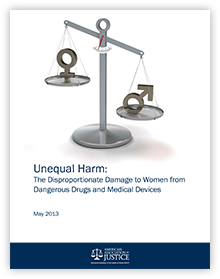So Why’d We Get Into Law?: On Dangerous Drugs, Pharmaceutical Companies and the Significant Harm Placed on Women When Profit Trumps Health

Fact: Women take more medicine than men, respond differently to medications than men and are more likely to suffer adverse side effects from medications than men; throughout history, women have suffered at the hands of dangerous drugs and devices more than men have – and this bad track record of suffering isn’t going anywhere.
Instead, the pharmaceutical companies and medical manufacturers of today live by a standard business model that more often than not involves a maximization of profits at the mercy of facts. Scratch that, they live by a standard business model that more often than not involves a maximization of profits at the mercy of patient safety, by ignoring the facts.
Pharmaceutical companies try to ignore the facts in a variety of ways. In medication trials and medical device evaluations, women are largely underrepresented – even though they take more medications than men. During the FDA approval process, pharmaceutical companies rely on the old practice of He Said/She Said to get their products quickly approved by saying the products are reiterations of products already on the market – a practice that also helps the companies skirt possible future blame. And once those reports of heart attacks, strokes, seizures, blood clots, severe pain and expensive revision surgeries come in, pharmaceutical companies rely on another old practice: Look the Other Way. You can count on it – pharmaceutical companies will try to get every last dollar they can out of a product before taking it off of the market. Doctors can report cases of death and instead of immediate action (the right thing to do when any serious injury is involved), pharmaceutical companies will more often then not partake in in the non-actions of He Said/She Said, Look the Other Way and let‘s get every last dollar we can.
In the American Association for Justice’s (AAJ) report, Unequal Harm: The Disproportionate Damage to Women from Dangerous Drugs and Medical Devices, former FDA Chief Counsel Margaret Porter divulges on the connection between regulation (the FDA) and civil justice (lawsuits involving defective products or misleading information) by saying that, “Each [provides] a significant, yet distinctive, layer of consumer protection.” We couldn’t agree more.
When FDA regulations cannot effectively take dangerous drugs and medical devices off the market because all of the He Said/She Said, Look the Other Way and the let‘s get every last dollar we can‘s loopholes and excuses get in the way, that’s when it’s time for civil justice to come in with lawsuits aimed at protecting consumer health.
We hope that one day pharmaceutical corporations will replace the excuses with genuine effort to look after the health and well-being of their consumer base just as much as they currently look after their corporate wealth. You would think pharmaceutical companies and manufacturers would but patient health first and foremost – after all that’s in their job description right, that’s what they signed up for when they decided to work in the pharmaceutical industry, right? Until that day comes, our lawyers are committed to protecting your health. In fact, that’s why we got into law in the first place.
